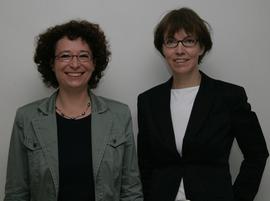2008 td-net Award for Transdisciplinary Research
Eawag’s strategy of bridging between cutting-edge research and practice has not gone unnoticed: the 2008 Award for Transdisciplinary Research – carrying a prize of CHF 75,000 – has been won by the Novaquatis urine source separation project. The award is made under the aegis of the Swiss Academies of Arts and Sciences “td-net for Transdisciplinary Research”, in recognition of the project managers’ commitment to transdisciplinarity: as well as integrating environmental, engineering and social scientific research, they sought the cooperation of non-academic partners at an early stage.

The Novaquatis project leaders Tove Larsen (right)
and Judit Lienert (Photo: Andri Bryner)
Downloads:
Diesen Text in Deutsch (pdf 32 kb)
This text in English (pdf 32 kb)
Interview mit Tove Larsen und Judit Lienert in Deutsch (45 kb)
The basic idea is simple: urine accounts for only 1% of the total volume of wastewater, but it contains up to 80% of all the nutrients. If it is processed separately, wastewater treatment plants can be reduced in size, water protection can be improved, and nutrients can be recycled. Separate treatment of wastewater streams thus opens up new possibilities, and there are many reasons for adopting urine source separation (“NoMix”) technology on a large scale. This applies in particular to emerging countries such as China, where sewerage and wastewater treatment facilities cannot keep up with the rapid pace of urbanization, and water pollution arising from domestic wastewater has reached devastating levels.
While the Eawag researchers’ approach may sound straightforward, there is no guarantee that it can be implemented in practice: infrastructure that is already in place cannot be transformed overnight; the new toilets still have some defects – pipes may be blocked by urine scale; the sanitary industry as yet sees little commercial potential in the NoMix technology, and the fertilizer produced from urine cannot yet compete with low-cost artificial products. So obstacles remain to be overcome. The prize money from the award is therefore to be used to support further research: if urine is to be treated with the aid of decentralized systems, and nutrients are to recovered in a concentrated form for recycling, what options offer the best prospects of implementation and the lowest environmental impact? For Tove Larsen, who received the award, together with Judit Lienert, at the 2008 Transdisciplinary Conference in Zurich, it is quite clear: “It’s standard practice for garden waste to be separately collected. So surely it should also be possible one day for the six kilograms of concentrated phosphorus produced each year by a family of four to be separately processed.”
Once again, the research will involve a transdisciplinary process. According to co-project manager Judit Lienert, this is one of the pillars on which Eawag’s work has always rested: “Problems can only be solved with the involvement of all stakeholders. That includes authorities, engineering consultants, and industrial partners, as well as consumers.”
More information / Mehr Infos:
- td-net: swiss-academies award for transdisciplinary research
- Novaquatis press releases / Medienmitteilungen: www.eawag.ch/media/20081127/index and www.eawag.ch/media/20070307
- Press photos / Pressbilder: www.eawag.ch/media/20070307/pressebilder